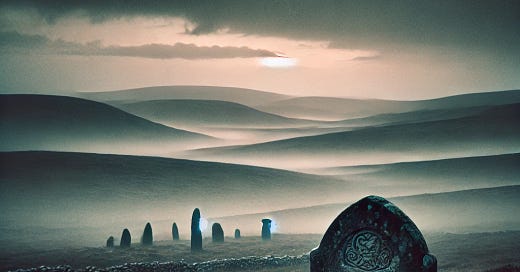In the highland glens and island moors of Scotland, a name once held the weight of ancestry, territory, and social role. Surnames were more than family tags — they were geographic coordinates, badges of clan loyalty, and echoes of a Gaelic tongue that shaped the lives of its speakers.
But what happens when a name disappears?
Across the Isles, from Loch Fyne to Arran and beyond, entire Gaelic surnames — some of them stretching back centuries — have vanished, seemingly overnight. This isn't just the story of families emigrating or lineages dying out. This is the tale of a linguistic erosion so subtle, it erased identities without bloodshed. In many cases, the descendants still exist — but their original names don’t.
Let’s dig into this quiet extinction — how it happened, and what it means for memory, heritage, and the power of language.
From Mac to Mist: The Fade-Out of Family Names
Consider names like MacVicars, MacKellars, Maclnturners, and MacCugs. Once found in every parish record and land rental roll of Argyll and the Western Isles, they are now absent from modern registries — or have morphed into something unrecognizable.
How did these Gaelic names disappear so completely? It happened at the collision point of language, law, and modernization.
1. Anglicization in Administrative Records
As English became the dominant language of legal and governmental processes, Gaelic names were transcribed phonetically — or replaced altogether. A name like MacMhurrich (pronounced roughly as Mac-voorich) became Murchie or Currie, losing its connection to the clan poet caste and becoming just another surname in a sea of Anglicized forms.
2. Land Loss and Social Displacement
Gaelic-speaking families were often removed from their ancestral lands through legal maneuvering or rent increases. When the MacVicars and MacKellars lost their holdings in Loch Fyne, they weren’t just dispossessed of land — they lost the context in which their names had meaning. Dispersed into cities or emigrated abroad, they were forced to adopt easier-to-pronounce identities to find work, safety, or social acceptance.
3. Clerical Errors and Bureaucratic “Reinvention”
As Gaelic speakers reported births, deaths, and marriages to English-speaking clerks, errors compounded. A Maclnturner might become a Turner, or vanish altogether if the name was misunderstood. A MacCug could morph into Cook, an occupational surname with no obvious trace of its Gaelic origin.
Names that Were Once Noble
Some of these “lost” surnames weren’t just casual identifiers — they were the names of military tenants of the Crown, of barons in the islands, and of faithful vassals to Robert the Bruce.
For instance, the MacCooks, MacKinnons, and MacBrides were granted land charters for their service in the Wars of Independence. By the time of the 1506 Bute Charter, they were fully embedded in the social fabric of the Isles, holding land not by favor, but by feudal right.
Yet even these honored names splintered under linguistic pressure. The MacLouies became Fullartons, a name that remains but sheds all trace of its Gaelic root. The transformation was quiet but profound — an ethnic and cultural rebranding driven not by conquest but by assimilation.
In some villages on Arran, you can find families still living on ancestral plots, completely unaware that their surname was once different — and once Gaelic.
Echoes of the Erased: Why This Still Matters
When a name vanishes, it's not just a phonetic shift. It’s a rupture in memory. A break in the chain that links people to land, to language, and to each other.
Modern genealogists often hit a wall when trying to trace Scottish ancestry, only to discover that the surname they’re looking for no longer exists — or was replaced with something generic. “Currie” might have once meant a royal bard of Clan Donald. “Brown” might mask a MacBraon or MacBrayne, with a story all its own. But unless the oral history was preserved, that context is lost.
And that’s the tragedy. These aren’t just lost words — they’re lost lineages.
Still, remnants remain.
Old maps, property records, and Gaelic proverbs (like “Clann Bhridean agus clann Ennain, na cloinne a’s sine ann an Arrinn”) preserve some of the memory. So too do standing stones marking ancient clan boundaries, and oral traditions passed down in families who no longer recognize their ancestral names.
Reclaiming the Names
Today, there's a quiet movement toward name reclamation. Scottish Gaelic is seeing a revival, and along with it, a renewed interest in original surnames.
Some families have even petitioned to return to their Gaelic names, honoring both their heritage and the history of a culture nearly lost to anglicization. Scholars are helping map Anglicized surnames back to their Gaelic roots, offering tools for descendants to rediscover who they are — and where they come from.
In the end, the story of vanished Gaelic names isn’t just about the past. It’s a reminder of how language shapes identity, and how fragile — yet resilient — that identity can be.





